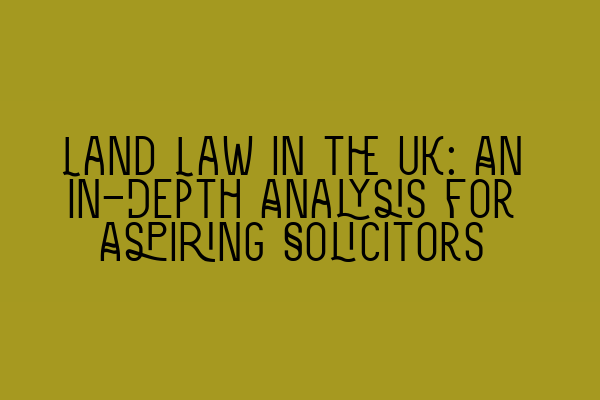Land Law in the UK: An In-Depth Analysis for Aspiring Solicitors
As an aspiring solicitor, understanding land law in the UK is essential for success in your legal career. Land law encompasses a broad range of topics, including property ownership, rights and obligations, and legal remedies in case of disputes. In this in-depth analysis, we will explore the key principles of land law and provide you with the knowledge you need to navigate this complex area of law.
The Importance of Land Law
Land is a valuable asset, and its ownership and use can have significant legal implications. Whether you are dealing with residential or commercial properties, understanding land law is crucial in various legal contexts, such as conveyancing, property disputes, and landlord-tenant relationships.
Moreover, land law forms the foundation of property rights and is vital for maintaining the integrity of the legal system. Solicitors specializing in property law must have a solid understanding of land law principles to provide effective legal advice and representation to their clients.
Key Principles of Land Law
1. Property Ownership: The foundation of land law lies in determining the ownership of a property. Property ownership can be held singly or jointly, and it is crucial to establish the legal title and any restrictions or easements associated with it.
2. Registered and Unregistered Land: In the UK, land can be registered or unregistered. Registered land is recorded in the Land Registry, providing a transparent and reliable record of ownership. Unregistered land lacks this official record, making the conveyancing process more complex.
3. Legal Estates and Interests: Land law distinguishes between legal estates and legal interests. Legal estates include freehold and leasehold estates, while legal interests encompass rights and obligations that exist alongside the legal estate, such as mortgages or easements.
4. Leases and Tenancies: Leases and tenancies govern the relationship between landlords and tenants. Understanding the rights and obligations of each party and the relevant statutory regulations is critical in handling residential or commercial property matters.
5. Covenants and Restrictions: Covenants and restrictions are binding obligations that affect the use and development of land. They can be positive (requiring the owner to take a specific action) or negative (prohibiting certain activities).
6. Easements: Easements are rights that give a person a legal interest over a property owned by someone else, such as access rights, drainage rights, or rights of way. Understanding easements is essential when dealing with property transactions or disputes.
Legal Remedies in Land Law Disputes
Land law disputes can arise due to various reasons, such as boundary disputes, breach of covenants, or adverse possession claims. In such cases, understanding the available legal remedies is crucial to protect your client’s interests.
Common legal remedies include:
1. Injunctions: An injunction is a court order that prevents a party from taking a particular action or requires them to perform a specific action. In land law disputes, injunctive relief can be sought to stop trespassing, enforce easements, or prevent development in breach of restrictive covenants.
2. Damages: Damages may be awarded in cases where one party has suffered a financial loss due to another party’s actions or breach of contract. In land law, damages can be sought for loss of value, loss of use, or costs incurred as a result of the dispute.
3. Specific Performance: Specific performance is a legal remedy that requires a party to fulfill their contractual obligations as agreed. In land law, specific performance can be sought to enforce the transfer of property or the completion of a contract.
4. Declaratory Relief: Declaratory relief is a court judgment that determines the parties’ rights and obligations without awarding any damages or imposing any orders. It can be sought to clarify ownership or resolve uncertainties in property disputes.
Preparing for a Career in Property Law
As an aspiring solicitor in property law, it is essential to ensure you have the necessary knowledge and skills to succeed in this competitive field. Proper preparation involves not only deepening your understanding of land law but also honing your practical skills and exam readiness.
Consider taking advantage of professional courses and resources to enhance your knowledge and increase your chances of success in the Solicitors Qualifying Examination (SQE). Courses like SQE 1 and SQE 2 preparation courses can provide comprehensive coverage of the key areas of law, including land law, while also offering practice exams and mocks to improve your exam performance.
Additionally, utilizing practice exam questions like the ones provided in the SQE 1 Practice Exam Questions article and taking practice mocks such as the FLK1 FLK2 Practice Mocks article can help you assess your strengths and weaknesses and familiarize yourself with the format of the SQE exams.
By combining theoretical knowledge with practical application and exam preparation, you can position yourself for a successful career in property law.
Stay informed about the latest SRA SQE exam dates and requirements to ensure timely planning and registration for your exams. Knowing the exam schedule and respective deadlines will help you allocate sufficient time for preparation, eliminating unnecessary stress and last-minute challenges.
In conclusion, land law plays a crucial role in the UK’s legal system, and aspiring solicitors in property law must have a solid understanding of its principles. By grasping the key principles of land law and familiarizing yourself with the legal remedies available in case of disputes, you will be well-equipped to provide expert advice and representation to clients. Combine your knowledge with practical skills and exam preparation to excel in the Solicitors Qualifying Examination and launch a successful career in property law.
Related Articles:
